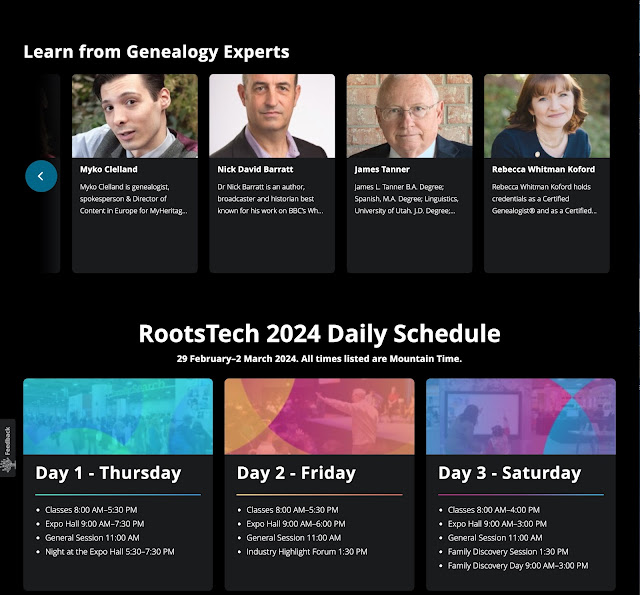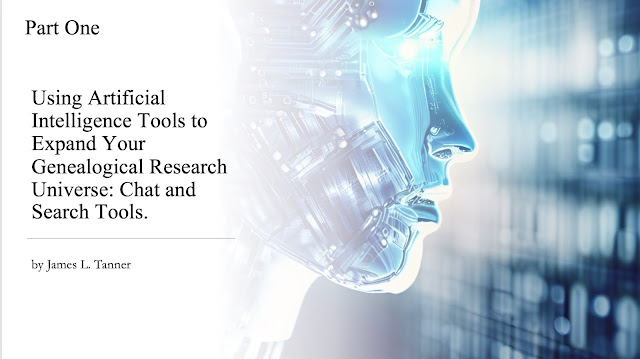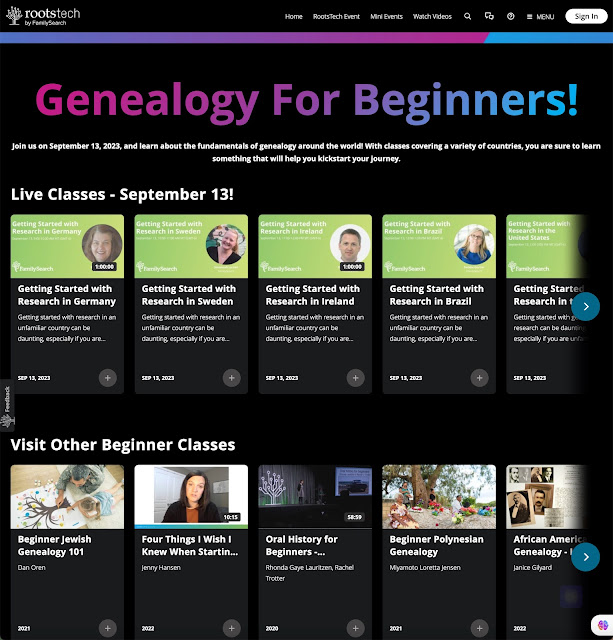RootTech 2024 is ramping up. In preparation for the live and online conference February 29th to March 2nd, 2024. The live conference will be held in the Salt Palace in Salt Lake City, Utah. Online classes will be available at the beginning of the conference.
I will be speaking live on September 13th. You can see the schedule above of all the classes being offered live on that date. My class, Help for the Absolute Genealogy Beginner, will be at 3:50 pm Mountain Daylight Time or GMT-6. You can click on the link to each class from the RootsTech website.
Just in case you get confused about time, GMT-6 is six hours behind Greenwich Mean Time (GMT). It's also known as Central Standard Time (CST) during the winter months. During the summer months, it's called Central Daylight Time (CDT).
GMT-6 is used in the Central Standard Time Zone in the United States. It's also used when states in the Mountain Time Zone operate Daylight Saving Time.
Some of us who are online all the time have to think about time zones continually.
Here is a list of all the speakers and their presentations include the following. All times are MDT/GMT-6 time.
Getting Started with Research in Germany, Wednesday, September 13th, 2023 at 9:00 am
Getting started with research in an unfamiliar country can be daunting, especially if you are unfamiliar with the language, records, and resources available. In this class, we will introduce key records, resources, strategies, and tools for researching in Germany
Baerbel Johnson, AG
Baerbel works as a German Research Specialist at the FamilySearch Library in Salt Lake City, Utah. Baerbel was born in Germany and started her family history journey after she immigrated to the United States. Baerbel is accredited in Germany and has worked for FamilySearch for more than 20 years.
Getting Started with Research in Sweden Wednesday, September 13th, 2023 at 10:00 AM
Getting started with research in an unfamiliar country can be daunting, especially if you are unfamiliar with the language, records, and resources available. In this class, we will introduce key records, resources, strategies, and tools for researching in Sweden.
Savannah Larson, AG
Savannah Larson has always been fascinated by stories of heritage and connection. With fluency in Swedish and proficiency in Danish and Norwegian, Savannah is accredited in Swedish research and works as a Nordic Research Specialist at the FamilySearch Library in Salt Lake City. In her free time, she enjoys volunteering with a youth leadership organization called HOBY, painting, reading, and spending time with her growing family.
Getting Started with Research in Ireland Wednesday, September 13th, 2023 at 11:00 AM
Getting started with research in an unfamiliar country can be daunting, especially if you are unfamiliar with the records and resources available. In this class, we will introduce key records, resources, strategies, and tools for researching in Ireland.
Dan Poffenberger, AG
Dan Poffenberger, AG® is a Senior British and Irish Research Specialist for FamilySearch at the FamilySearch. He is accredited by the International Commission for the Accreditation of Professional Genealogists (ICAPGen) in England research. He has been a professional genealogist for 34 years specializing in England, Ireland and United States research. He received a Bachelor of Arts Degree from Brigham Young University in Political Science, with a minor in Family and Community History. He and his wife Keirstin have been married for 35 years and have 5 children. Dan has presented at numerous conferences around the United States and internationally.
Getting Started with Research in Brazil Wednesday, September 13th, 2023 at 12:00 PM
Getting started with research in an unfamiliar country can be daunting, especially if you are unfamiliar with the language, records, and resources available. In this class, we will introduce key records, resources, strategies, and tools for researching in Brazil.
Debbie Gurtler, AG
Debbie Gurtler is the Assistant Director of the FamilySearch Library in Salt Lake City. With a BA in Family History from Brigham Young University, she holds five Accredited Genealogist® credentials for the United States Mid-South, Spain, Mexico, Portugal, and Chile. Fluent in Spanish from living over five years in South America. A frequent speaker on Hispanic research topics at local and national conferences. She is the mother of three and the grandmother of five.
Getting Started with Research in the United States Wednesday, September 13th, 2023 at 1:00 PM
Getting started with genealogy research can be daunting, especially if you are unfamiliar with the records and resources available. In this class, we will introduce key records, resources, strategies, and tools for researching in the United States.
Beth Taylor, CG
Getting Started with Research in Mexico Wednesday, September 13th, 2023 at 2:00 PM
Getting started with research in an unfamiliar country can be daunting, especially if you are unfamiliar with the language, records, and resources available. In this class, we will introduce key records, resources, strategies, and tools for researching in Mexico.
Debbie Gurtler, AG
Getting Started with Research in New Zealand Wednesday, September 13th, 2023 at 3:00 PM
Getting started with research in an unfamiliar country can be daunting, especially if you are unfamiliar with the records and resources available. In this class, we will introduce key records, resources, strategies, and tools for researching in New Zealand.
Raymon Naisbitt, AG
Help for the Absolute Genealogy Beginner Wednesday, September 13th, 2023 at 3:50 PM
Beginning with how to spell genealogy, this class walks through the process of starting your genealogical journey. Start by talking to your relatives, getting a genealogical DNA test, or just getting online with one of the major genealogy programs, all this is explained in a way to get you going on your family history.
James L. Tanner B.A; Spanish, M.A.; Linguistics, U of Utah, J.D. Degree; Law, ASU. 2 years, Intelligence Analyst, U.S. Army. 39 years Arizona trial attorney. 41+ years of genealogical research. Blogger of Genealogy’s Star blog. Ten years missionary at Mesa FSL. Presently serving at the BYU Family History Library. Member of FamilySearch GEDCOM Steering Committee. Chairman of the Board of Directors of The Family History Guide Association. Presenter at Expos and Conferences around the U.S. Canada and Europe. Presenter of over 400 genealogy videos on YouTube.
Fostering Genealogical Enthusiasm: Engaging the Next Generation Wednesday, September 13th, 2023 at 5:00 PM
Listen as Jana teaches how to engage the younger generations in genealogy work.
Jana Greenhalgh, Accredited Genealogist® specializing in England research. She graduated from BYU in 2003 with a BA degree in Genealogy & Family History, and now teaches family history there as adjunct faculty. She has also been an instructor for BYU-Idaho’s online family history degree program, served on the Board of Directors for the Utah Genealogical Association, and as the Level 1 Chair for ICAPGen’s Testing Committee. She currently serves on the Conferences & Education Committee for ICAPGen. She has presented at various genealogy conferences. Jana and her husband Brent live in Lehi, Utah with their seven children, and just for fun, they share their family history adventures via social media and online at www.TheGenealogyKids.com.
Tune in for these free live presentations. Look for other dates for additional RootsTech activities and presentations with a monthly theme. September's themes is Beginners in Genealogy.
I will be posting more information when it is announced on September 18th,





























